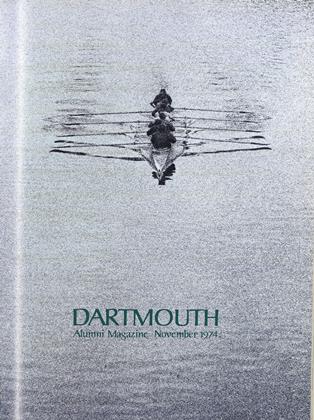THE Reserve Officers Training Corps, an outgrowth of the Navy V-12 program, came to Dartmouth not many months after V-J Day. In the ensuing years, Navy, Army, and Air Force units produced many cold warriors. Some went to Korea, some became submarine commanders, some became B-52 pilots. Others served six-month hitches at Fort Benning, spent a weekend a month at reserve meetings and two weeks at summer encampment, and wondered why. The last ROTC officer was commissioned at Dartmouth in June of 1973, six months after "peace with honor" was declared in Vietnam.
Dartmouth's ROTC program was terminated by decision of the Trustees after agitation and overwhelmingly negative votes by the students and faculty. Most observers interpreted the objections to ROTC as a form of denouncing American policies in Southeast Asia. The reasoning seemed to be that the military had gone wrong in Vietnam, that ROTC was part of the military, and therefore culpable.
Shortly after he became President, which was after ROTC had been voted out at Dartmouth, John Kemeny said that the time to reconsider ROTC was when the conflict in Vietnam had been resolved. Last fall, on behalf of the Trustees, he established a committee of faculty, students, and alumni to review the feasibility and desirability of an ROTC program at Dartmouth. A month ago, the committee issued an "interim analytical report" in The Bulletin.
In studying "the pros and cons of various options" the committee postulated a set of six model programs, which extended from the "present situation" to establishment of an ROTC program "similar to that previously operated at Dartmouth" to a program of compulsory service in which students would "spend a year or two in public service activities, including, as one option, military service."
Most of the 5,000-word report was taken up with questions the committee asked itself about the six model programs in the context of the educational purposes of the College, student opportunities and obligations, and national security. Oncampus ROTC programs, for example, were seen to have some shortcomings in terms of the educational purposes of the College, but they got higher marks in the category of national security. Some of the other options, such as off-campus ROTC or the public service program, fit in better with Dartmouth's avowed educational purposes, but depend on new federal legislation and a fairly drastic change in the government's present thinking.
The committee announced that a campus forum on ROTC at Dartmouth would be held on November 8, and invited written comment from alumni to provide the "broadest kind of help." As of two weeks before the forum, about 25 letters had been received from alumni. Some said the report was permeated by a bias against the military. Other writers favored off-campus military training or no connection whatever with the military.
Shortly after the report appeared, a group calling itself Concerned Students and Faculty Against ROTC mobilized on the campus. At strategy meetings, members announced plans to distribute anti-ROTC literature outside Hopkins Center before the Harvard game, conduct slide shows and peace vigils, and wage a mail campaign to urge like-minded persons to voice their opposition.
 View Full Issue
View Full Issue
More From This Issue
-
 Feature
FeatureDartmouth De Gustibus: Food for Thought
November 1974 By MICHAEL STUART -
 Feature
FeatureThe Great Rip-off
November 1974 By V.F.Z. -
 Feature
FeatureYou Can Go Home Again
November 1974 By DICK REDINGTON '64 -
 Feature
Feature"ring O bells!"
November 1974 By ELIZABETH F. MOORE -
 Article
ArticleBig Green Teams
November 1974 By JACK DtGANGE -
 Article
ArticleFurther Mention
November 1974 By J.H.
Article
-
 Article
ArticleBravery, self-sacrifice, the large spirit
February 1916 -
 Article
ArticleMEMORIAL FIELD WORK WELL UNDER WAY
August 1921 -
 Article
ArticleTHE UNDERGRADUATE CHAIR
DECEMBER 1927 -
 Article
ArticleAlumni Club Luncheons
March 1950 -
 Article
ArticleGIFTS, GRANTS & BEQUESTS
November 1968 -
 Article
ArticleSchools for the Twenty-First Century
April 1993 By Professor Faith Dunne

